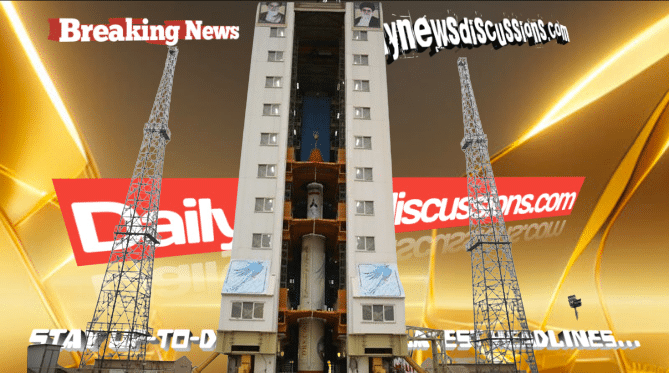
Iran announced on Sunday that it had successfully launched three satellites into space using a rocket with a history of multiple failures. The launch is part of a program that Western nations argue enhances Tehran’s ballistic missiles, raising tensions in the already volatile Middle East. The move comes amidst the ongoing conflict between Israel and Hamas in the Gaza Strip, leading to concerns of a potential regional conflict.
Rocket Launch and Satellites
Footage released by Iranian state television showed a nighttime launch of the Simorgh rocket at the Imam Khomeini Spaceport in Iran’s Semnan province. The launched satellites were named Mahda, Kayhan-2, and Hatef-1. While Mahda is described as a research satellite, Kayhan-2 and Hatef-1 are nanosatellites focused on global positioning and communication, respectively. Iran’s Information and Communications Technology Minister, Isa Zarepour, reported that Mahda had already sent signals back to Earth.
Simorgh Program Challenges
The Simorgh program, which uses a satellite-carrying rocket, has faced setbacks, with five consecutive failed launches. The recent launch displayed the slogan “We Can” in Farsi, likely in reference to previous failures. The Simorgh is a two-stage, liquid-fueled rocket designed to place satellites into low Earth orbit.
Global Concerns and US Response
The U.S. intelligence community’s 2023 worldwide threat assessment highlighted concerns that Iran’s satellite launch vehicles could potentially shorten the timeline for developing an intercontinental ballistic missile. The United States has previously asserted that Iran’s satellite launches violate a U.N. Security Council resolution. However, U.N. sanctions related to Iran’s ballistic missile program expired in October 2023.
Political Shifts and President Raisi’s Stance
Under former President Hassan Rouhani, Iran slowed its space program to avoid escalating tensions with the West. However, under the current hard-line President Ebrahim Raisi, the program has advanced. Despite enriching uranium closer to weapons-grade levels, U.S. intelligence agencies assess that Iran has not actively pursued a nuclear weapon.
International Condemnation
France, Germany, and the United Kingdom condemned Iran’s satellite launch on January 20, expressing concerns about its potential to aid in the development of long-range ballistic missiles. Iran maintains the largest ballistic missile arsenal in the Middle East.
Ongoing Regional Tensions
As the region faces heightened tensions, including Israel’s conflict with Hamas, Iran has faced pressure to take action. A drone attack claimed by Iranian-backed Iraqi militias recently killed three U.S. troops and wounded others in Jordan.
UK Shoots Down Houthi Drone
In a separate development, the United Kingdom’s Defense Ministry acknowledged that one of its warships shot down a drone launched by Houthi rebels from Yemen. The HMS Diamond used its Sea Viper missile system in the Red Sea, emphasizing the need to protect freedom of navigation.
Iran’s satellite launch adds complexity to an already tense region, with global powers expressing concerns about the potential dual-use nature of its space program. As political dynamics continue to shift, the Middle East remains a focal point of international attention.
